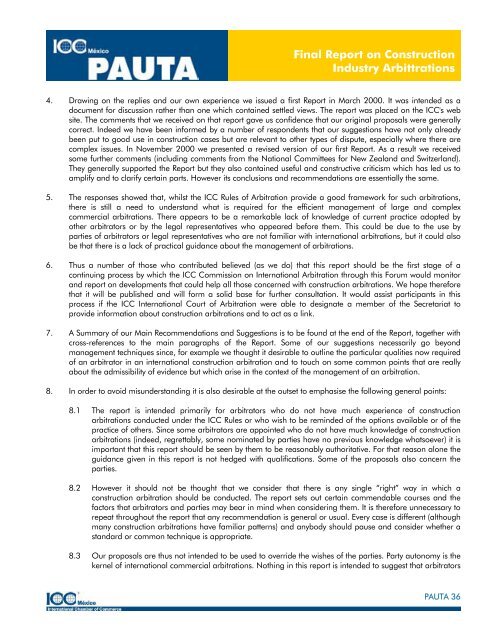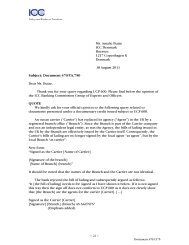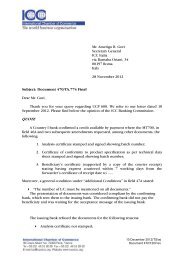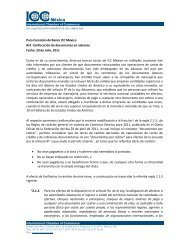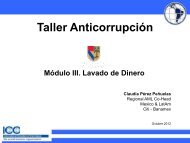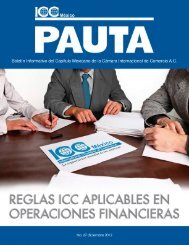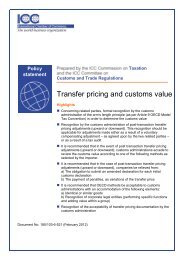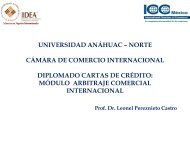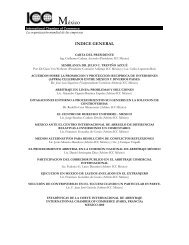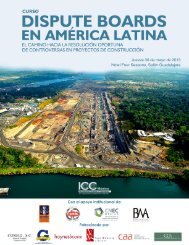Pauta 54.pdf - ICC México
Pauta 54.pdf - ICC México
Pauta 54.pdf - ICC México
- No tags were found...
You also want an ePaper? Increase the reach of your titles
YUMPU automatically turns print PDFs into web optimized ePapers that Google loves.
Final Report on ConstructionIndustry Arbittrations4. Drawing on the replies and our own experience we issued a first Report in March 2000. It was intended as adocument for discussion rather than one which contained settled views. The report was placed on the <strong>ICC</strong>'s website. The comments that we received on that report gave us confidence that our original proposals were generallycorrect. Indeed we have been informed by a number of respondents that our suggestions have not only alreadybeen put to good use in construction cases but are relevant to other types of dispute, especially where there arecomplex issues. In November 2000 we presented a revised version of our first Report. As a result we receivedsome further comments (including comments from the National Committees for New Zealand and Switzerland).They generally supported the Report but they also contained useful and constructive criticism which has led us toamplify and to clarify certain parts. However its conclusions and recommendations are essentially the same.5. The responses showed that, whilst the <strong>ICC</strong> Rules of Arbitration provide a good framework for such arbitrations,there is still a need to understand what is required for the efficient management of large and complexcommercial arbitrations. There appears to be a remarkable lack of knowledge of current practice adopted byother arbitrators or by the legal representatives who appeared before them. This could be due to the use byparties of arbitrators or legal representatives who are not familiar with international arbitrations, but it could alsobe that there is a lack of practical guidance about the management of arbitrations.6. Thus a number of those who contributed believed (as we do) that this report should be the first stage of acontinuing process by which the <strong>ICC</strong> Commission on International Arbitration through this Forum would monitorand report on developments that could help all those concerned with construction arbitrations. We hope thereforethat it will be published and will form a solid base for further consultation. It would assist participants in thisprocess if the <strong>ICC</strong> International Court of Arbitration were able to designate a member of the Secretariat toprovide information about construction arbitrations and to act as a link.7. A Summary of our Main Recommendations and Suggestions is to be found at the end of the Report, together withcross-references to the main paragraphs of the Report. Some of our suggestions necessarily go beyondmanagement techniques since, for example we thought it desirable to outline the particular qualities now requiredof an arbitrator in an international construction arbitration and to touch on some common points that are reallyabout the admissibility of evidence but which arise in the context of the management of an arbitration.8. In order to avoid misunderstanding it is also desirable at the outset to emphasise the following general points:8.1 The report is intended primarily for arbitrators who do not have much experience of constructionarbitrations conducted under the <strong>ICC</strong> Rules or who wish to be reminded of the options available or of thepractice of others. Since some arbitrators are appointed who do not have much knowledge of constructionarbitrations (indeed, regrettably, some nominated by parties have no previous knowledge whatsoever) it isimportant that this report should be seen by them to be reasonably authoritative. For that reason alone theguidance given in this report is not hedged with qualifications. Some of the proposals also concern theparties.8.2 However it should not be thought that we consider that there is any single “right” way in which aconstruction arbitration should be conducted. The report sets out certain commendable courses and thefactors that arbitrators and parties may bear in mind when considering them. It is therefore unnecessary torepeat throughout the report that any recommendation is general or usual. Every case is different (althoughmany construction arbitrations have familiar patterns) and anybody should pause and consider whether astandard or common technique is appropriate.8.3 Our proposals are thus not intended to be used to override the wishes of the parties. Party autonomy is thekernel of international commercial arbitrations. Nothing in this report is intended to suggest that arbitratorsPAUTA 36


